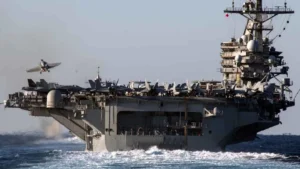Confidential documents released on Wednesday indicate that Germany is preparing for the potential deployment of up to 800,000 NATO troops, including American forces, to Ukraine as concerns over Russia’s nuclear threats intensify.
Operation Deutschland
A comprehensive 1,000-page strategy, referred to as “Operation Deutschland,” outlines Germany’s contingency plans for a potential World War III scenario. According to Frankfurter Allgemeine Zeitung, the classified documents include measures to secure critical infrastructure and instructions for civilians and businesses to enhance readiness in response to escalating threats.
The plan also reportedly includes logistics for facilitating the movement of 200,000 military vehicles through German territory if NATO were to increase its involvement in Ukraine. Specifics on these operations remain classified. Additionally, citizens are being encouraged to improve self-sufficiency by adopting measures such as installing diesel generators or wind turbines.
NATO countries preparing for potential spillover
The sense of alarm is not confined to Germany. Both Sweden and Norway have recently issued guidance to their citizens on preparing for potential spillover from the Ukraine conflict into their territories.
Tensions have risen further following Russian President Vladimir Putin’s announcement on Tuesday revising Moscow’s nuclear policy. The new directive allows the use of nuclear weapons in response to conventional strikes, a shift seen as a direct warning to Western allies.
While Germany has faced criticism for perceived delays in fully supporting Ukraine since the war began in 2022, Foreign Minister Annalena Baerbock reaffirmed Germany’s resolve, stating the nation would not be intimidated by Putin’s tactics. Baerbock emphasized that Russia’s strategy of exploiting fear has been ongoing since its annexation of Crimea in 2014, criticizing Germany’s past political approach of relying on Kremlin assurances. She called for increased investment in national security and defense.
NATO in action
This policy shift follows the U.S. decision to provide Ukraine with long-range missiles capable of striking deep into Russian territory, removing a prior buffer zone of approximately 190 miles. This development, along with Germany’s strategic planning, has been driven by reports of Russia seeking military reinforcements from North Korea, potentially involving 10,000 troops with the possibility of an additional 100,000.
Experts and officials have described the potential involvement of U.S. troops as one of the most significant escalations in the war since its inception.
Addressing the Ukraine war
Amid these developments, former U.S. President Donald Trump has been vocal at campaign events about the risk of a global conflict, citing growing tensions involving Russia, North Korea, and Iran. Although Trump has not presented a formal strategy for addressing the Ukraine war, his recent interactions suggest an openness to supporting Ukraine’s objectives.
According to sources, Trump has signaled he may allow Ukraine to continue its military operations against Russia, aligning with Ukrainian President Volodymyr Zelensky’s “victory plan.” Zelensky has actively sought international backing for this strategy, which includes taking direct actions against Russia to expedite an end to the conflict.
Following Trump’s 2024 election victory, Zelensky expressed optimism about strengthened U.S.-Ukraine relations, highlighting Trump’s “peace through strength” philosophy. Zelensky reiterated this sentiment during recent interviews, suggesting that the incoming administration’s approach could lead to a diplomatic resolution to the war by next year. However, he warned that without continued U.S. military aid, Ukraine’s ability to defend itself would be severely compromised.
Read More: Operations In US Embassy In Kyiv Resumes After Halting A Day Due To Threat Alert






















